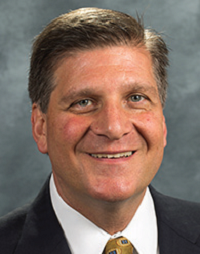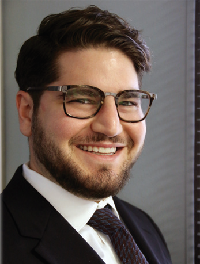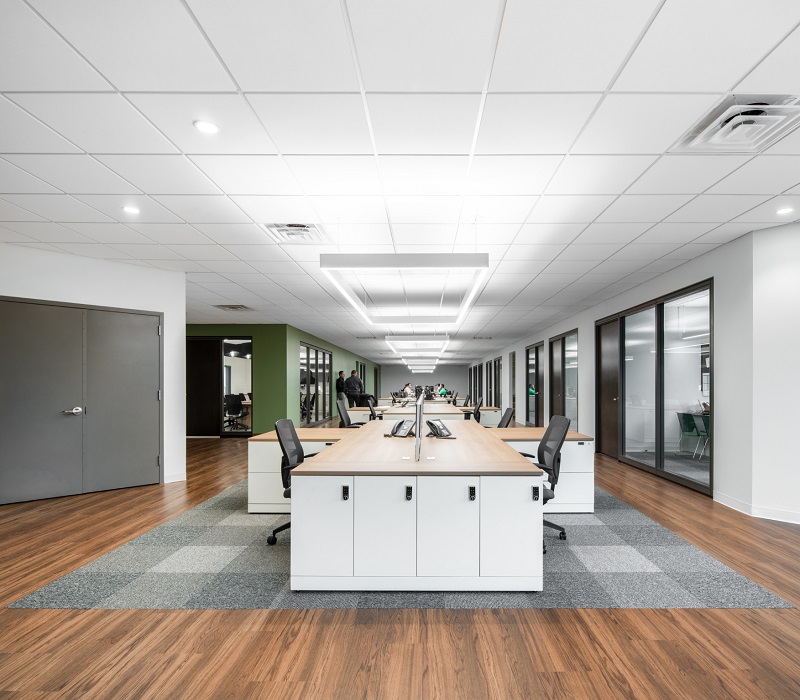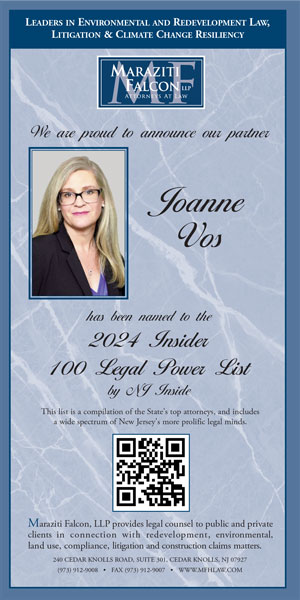At Cascades Inc.’s new containerboard manufacturing plant in Piscataway, the build-out by Greek Development included a sleek 20,000-square-foot office space to house the company’s regional headquarters. Other features include large windows that bring in natural light, an on-site gym and a layout that promotes better air flow throughout the property. – Courtesy: Greek Development
By Joshua Burd
It was a rather weighty decision for a corporate executive, who was seeking to relocate his company’s U.S. headquarters while balancing the needs of some 1,400 employees.
As Jeff Babikian recalled, his client ultimately picked a site just a few miles from its existing office in Somerset County, one that would check every box and minimize the disruption to its workforce. That made it the clear choice.

“At the end of the day, he said, ‘When our employees taste what it’s like to get to the kid’s game on time or home in 25 minutes — versus an hour and a half into the city and an hour and a half back, on a good day —it’s a game changer,” said Babikian, a broker and executive vice president with CBRE. He added: “So it checked all of these boxes. The bottom line is that the lack of disruption is key to these companies.”
Babikian described the deal during a NAIOP New Jersey panel discussion in mid-June. A month later, Everest Reinsurance Co. joined its new landlords, Vision Real Estate Partners and Rubenstein Partners L.P., in announcing its new 315,000-square-foot lease at the sprawling Warren Corporate Center campus in Warren, whose centerpiece is a sleek new 20,000-square-foot amenity building.
It was a reminder that human resources decisions — namely, the quest to attract and retain talent — are driving corporate real estate selection more than ever. New Jersey developers are responding by designing spaces and high-end amenities that meet those needs, while expanding their focus on the labor markets around their project sites.
“I would say that most, if not all, of the processes have been HR-driven, versus C-suite-driven, like we’ve seen in the past,” said Michael Sommer, the senior vice president for development and construction with Cedar Realty Trust Inc. and previously an executive with Edison Properties. In his prior role, Sommer spearheaded the $80 million adaptive reuse project known as Ironside Newark, where Mars Wrigley Confectionary U.S. is leasing 110,000 square feet.

The deal provided an insight into how the focus of corporate real estate has changed.
“It was certainly all about the labor pool,” said Sommer, who was Edison’s executive vice president of development before joining Cedar Realty in mid-June. “At the end of the day, it was all about the attraction and retention of that labor.”
Like other developers, Edison sought to outfit its property with the type of features that will help tenants be competitive with prospective employees. At Ironside, which totals more than 450,000 square feet, amenities include more than 100,000 square feet of ground-floor retail and restaurant space and a new glass-encased penthouse on the building’s roof.
The downtown Newark property also abuts the newly opened, three-acre park known as Mulberry Commons, which has ping pong, slides and abundant seating.
“The line between residential amenities and commercial amenities is certainly blurred these days,” Sommer said. “So the HR-driven process is looking for rooftop amenities, they’re looking for retail plazas, where they have access to food and beverage, either in the building or in close proximity.”

Sommer, Babikian and other insiders spoke June 12 during the NAIOP New Jersey program — titled “The C-Suite Perspective on How HR Drives CRE Decisions.” Moderated by former Lt. Gov. Kim Guadagno, now a partner with Connell Foley LLP, the panel also featured executives from Cascades Inc., a containerboard manufacturer that recently opened a new plant in Piscataway.
The discussion came as office tenants continue to flock to modernized buildings across the state. Developers who invest in high-end improvements and overhauls can command rents that are $5 to $6 per square foot higher, Babikian said, and employee-focused tenants are willing to pay up.
“All of these decision-makers, with this tight labor market, don’t want to take a chance in picking the wrong building,” said Babikian, who is based in CBRE’s Saddle Brook office. “They’re looking for that right building. In their minds, they already have a preconceived notion of where they belong. They want to feel like they’re in New York when they’re in New Jersey, and this type of build-out is critical.”
Industrial landlords and their tenants are also increasingly focused on employee retention, as labor becomes increasingly competitive in the logistics and manufacturing sectors. Cascades’ new 452,000-square-foot plant at 2 Turner Place — built by Greek Development and LaSalle Investment Management — places a greater emphasis on aesthetics than factories of past generations.
To that end, Greek Development’s fit-out included large windows that bring in natural light, an on-site gym and a 20,000-square-foot office to house Cascades’ regional headquarters, said David Greek, the firm’s acquisitions director. The developer also tweaked its design to provide for better air flow throughout the property for Cascades employees.

“Traditionally, industrial parks have had no amenities,” Greek said. “We were lucky if they had landscaping, so it’s a big shift we’re going through in the industrial world.”
Many of the amenities are “tenant-driven,” he said. In Piscataway, Cascades’ focus is “How do I make sure that my employees are happy and healthy while they’re working in this environment and, at the same time, make it efficient for moving my product?”
Taking that approach “was somewhat new to us” as a developer, Greek said during the NAIOP panel. Since then, the East Brunswick-based firm has begun to incorporate some of those same design features into its speculative industrial projects.
“These aren’t ping pong tables, these aren’t the typical amenities you’d see in a multifamily or office development,” Greek added, “but these are quality of life things that we are designing into our buildings to help make it a more pleasant place to work and live.”
Another developer, Crow Industrial Holdings, highlighted a similar strategy in late June when detailing a new 925,000-square-foot warehouse project in Franklin. That has led to a design that calls for large translucent windows that provide natural light and murals that infuse the property with a sense of vibrancy, along with access points for food trucks and on-site walking trails.

“With unemployment near record lows, labor is on the mind of all industrial tenants,” said Jules Nissim, a vice chairman with Cushman & Wakefield, who is part of the leasing team at the property. “The combination of strong demographics, proximity to mass transportation and the amenities that Crow Holdings is providing will definitely make this property particularly appealing to users.”
Greek Development is now diving even deeper when it comes to the talent pool surrounding its projects.
“Labor is something we spend a lot of time on with potential tenants,” Greek said. “In our new projects that we’re undertaking now, we took the time and spent the money to execute labor studies up front, so we have that data and we can hand that to our tenants and say, ‘Here’s what you’re working with in this market,’ ” he said. “And that’s been very critical to our marketing efforts on new projects.”










